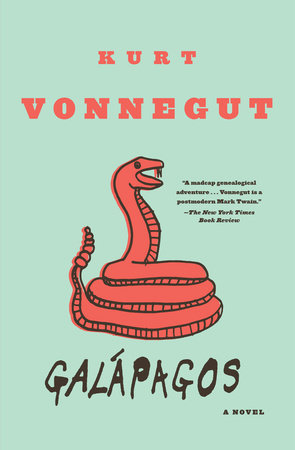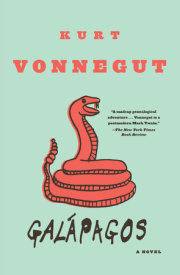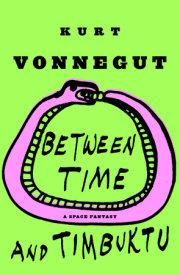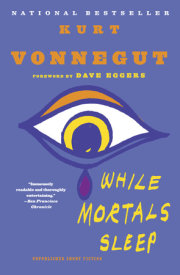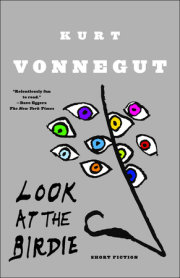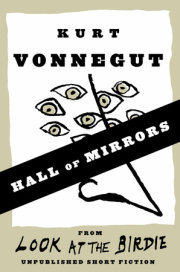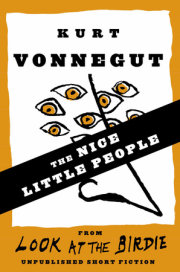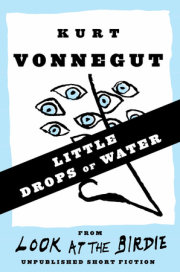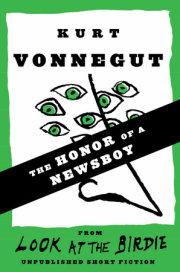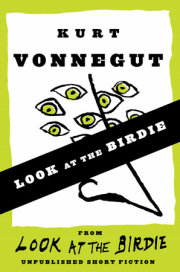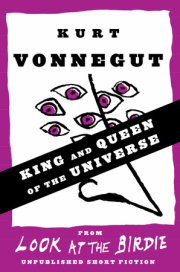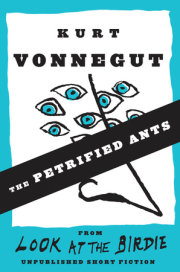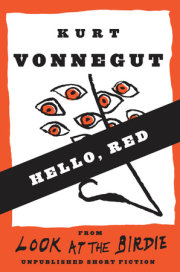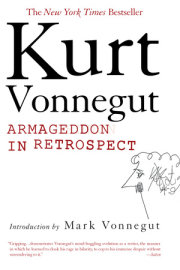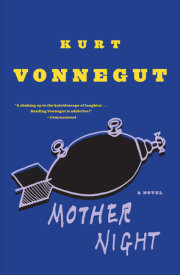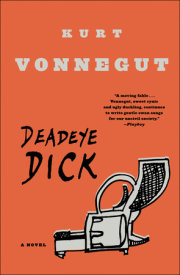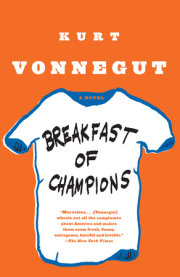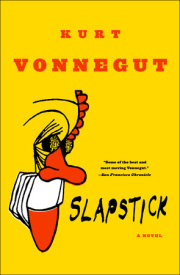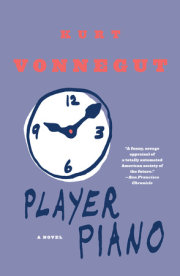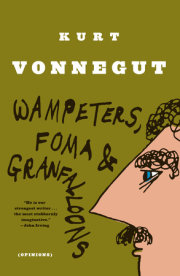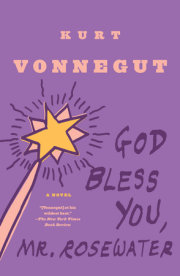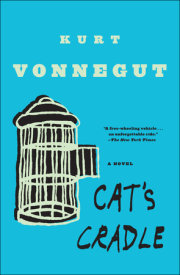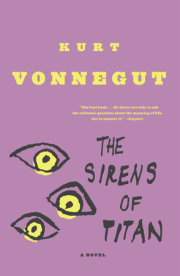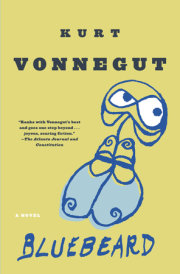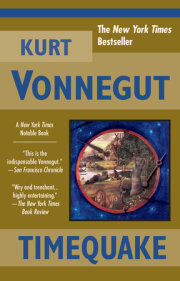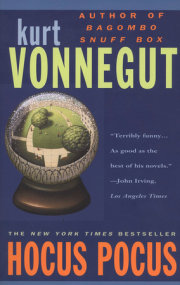Chapter One
The Thing Was:
One million years ago, back in 1986 A.D., Guayaquil was the chief seaport of the little South American democracy of Ecuador, whose capital was Quito, high in the Andes Mountains. Guayaquil was two degrees south of the equator, the imaginary bellyband of the planet after which the country itself was named. It was always very hot there, and humid, too, for the city was built in the doldrums--on a springy marsh through which the mingled waters of several rivers draining the mountains flowed.
This seaport was several kilometers from the open sea. Rafts of vegetable matter often clogged the soupy waters, engulfing pilings and anchor lines.
. . .
Human beings had much bigger brains back then than they do today, and so they could be beguiled by mysteries. One such mystery in 1986 was how so many creatures which could not swim great distances had reached the Galápagos Islands, an archipelago of volcanic peaks due west of Guayaquil--separated from the mainland by one thousand kilometers of very deep water, very cold water fresh from the Antarctic. When human beings discovered those islands, there were already geckos and iguanas and rice rats and lava lizards and spiders and ants and beetles and grasshoppers and mites and ticks in residence, not to mention enormous land tortoises.
What form of transportation had they used?
Many people were able to satisfy their big brains with this answer: They came on natural rafts.
. . .
Other people argued that such rafts became waterlogged and rotted to pieces so quickly that nobody had ever seen one out of sight of land, and that the current between the islands and the mainland would carry any such rustic vessel northward rather than westward.
Or they asserted that all those landlubberly creatures had walked dry-shod across a natural bridge or had swum short distances between stepping-stones, and that one such formation or another had since disappeared beneath the waves. But scientists using their big brains and cunning instruments had by 1986 made maps of the ocean floor. There wasn't a trace, they said, of an intervening land mass of any kind.
. . .
Other people back in that era of big brains and fancy thinking asserted that the islands had once been part of the mainland, and had been split off by some stupendous catastrophe.
But the islands didn't look as though they had been split off from anything. They were clearly young volcanoes, which had been vomited up right where they were. Many of them were such newborns out there that they could be expected to blow again at any time. Back in 1986, they hadn't even sprouted much coral yet, and so were without blue lagoons and white beaches, amenities many human beings used to regard as foretastes of an ideal afterlife.
A million years later, they do possess white beaches and blue lagoons. But when this story begins, they were still ugly humps and domes and cones and spires of lava, brittle and abrasive, whose cracks and pits and bowls and valleys brimmed over not with rich topsoil of sweet water, but with the finest, driest volcanic ash.
. . .
Another theory back then was that God Almighty had created all those creatures where the explorers found them, so they had had no need for transportation.
. . .
Another theory was that they had been shooed ashore there two by two--down the gangplank of Noah's ark.
If there really was a Noah's ark, and there may have been--I might entitle my story "A Second Noah's Ark."
Chapter TwoThere was no mystery a million years ago as to how a thirty-five-year-old American male named James Wait, who could not swim a stroke, intended to get from the South American continent to the Galápagos Islands. He certainly wasn't going to squat on a natural raft of vegetable matter and hope for the best. He had just bought a ticket at his hotel in downtown Guayaquil for a two-week cruise on what was to be the maiden voyage of a new passenger ship called the Bahía de Darwin, Spanish for "Darwin Bay." This first Galápagos trip for the ship, which flew the Ecuadorian flag, had been publicized and advertised all over the world during the past year as "the Nature Cruise of the Century."
Wait was traveling alone. He was prematurely bald and he was pudgy, and his color was bad, like the curst on a pie in a cheap cafeteria, and he was bespectacled, so that he might plausibly claim to be in his fifties, in case he saw some advantage in making such a claim. He wished to seem harmless and shy.
He was the only customer now in the cocktail lounge of the Hotel El Dorado, on the broad Calle Diez de Agosto, where he had taken a room. And the bartender, a twenty-year-old descendant of proud Inca noblemen, named Jesús Ortiz, got the feeling that this drab and friendless man, who claimed to be a Canadian, had had his spirit broken by some terrible injustice or tragedy. Wait wanted everybody who saw him to feel that way.
Jesús Ortiz, who is one of the nicest people in this story of mine, pitied rather than scorned this lonesome tourist. He found it sad, as Wait had hoped he would, that Wait had just spent a lot of money in the hotel boutique--on a straw hat and rope sandals and yellow shorts and a blue-and-white-and-purple cotton shirt, which he was wearing now. Wait had had considerable dignity, Ortiz thought, when he had arrived from the airport in a business suit. But now, at great expense, he had turned himself into a clown, a caricature of a North American tourist in the tropics.
The price tag was still stapled to the hem of Wait's crackling new shirt, and Ortiz, very politely and in good English, told him so.
"Oh?" said Wait. He knew the tag was there, and he wanted it to remain there. But he went through a charade of self-mocking embarrassment, and seemed about to pluck off the tag. But then, as though overwhelmed by some sorrow he was trying to flee from, he appeared to forget all about it.
. . .
Wait was a fisherman, and the price tag was his bait, a way of encouraging strangers to speak to him, to say in one way or another what Ortiz had said: "Excuse me, Senor, but I can't help noticing--"
Wait was registered at the hotel under the name on his bogus Canadian passport, which was Willard Flemming. He was a supremely successful swindler.
Ortiz himself was in no danger from him, but an unescorted woman who looked as though she had a little money, and who was without a husband and past childbearing, surely would have been. Wait had so far courted and married seventeen such persons--and then cleaned out their jewelry boxes and safe-deposit boxes and bank accounts, and disappeared.
He was so successful at what he did that he had become a millionaire, with interest-bearing savings accounts under various aliases in banks all over North America, and he had never been arrested for anything. For all he knew, nobody was even trying to catch him. As far as the police were concerned, he reasoned, he was one of seventeen faithless husbands, each with a different name, instead of a single habitual criminal whose real name was James Wait.
. . .
It is hard to believe nowadays that people could ever have been as brilliantly duplicitous as James Wait--until I remind myself that just about every adult human being back then had a brain weighing about three kilograms! There was no end to the evil schemes that a thought machine that oversized couldn't imagine and execute.
So I raise this question, although there is nobody around to answer it: Can it be doubted that three-kilogram brains were once nearly fatal defects in the evolution of the human race?
A second query: What source was there back then, save for our overelaborate nervous circuitry, for the evils we were seeing or hearing about simply everywhere?
My answer: There was no other source. This was a very innocent planet, except for those great big brains.
Chapter Three
The Hotel El Dorado was a brand-new, five-story tourist accommodation--built of unadorned cement block. It had the proportions and mood of a glass-front bookcase, high and wide and shallow. Each bedroom had a floor-to-ceiling wall of glass looking westward--toward the waterfront for deep-draft vessels dredged in the delta three kilometers away.
In the past, that waterfront had teemed with commerce, and ships from all over the planet had delivered meat and grain and vegetables and fruit and vehicles and clothing and machinery and household appliances, and so on, and carried away, in fair exchange, Ecuadorian coffee and cocoa and sugar and petroleum and gold, and Indian arts and crafts, including "Panama" hats, which had always come from Ecuador and not from Panama.
But there were only two ships out there now, as James Wait sat in the bar, nursing a rum and Coca-Cola. He was not a drinker, actually, since he lived by his wits, and could not afford to have the delicate switches of the big computer in his skull short-circuited by alcohol. His drink was a theatrical prop--like the price tab on his ridiculous shirt.
He was in no position to judge whether the state of affairs at the waterfront was normal or not. Until two days before, he had never even heard of Guayaquil, and this was the first time in his life he had ever been below the equator. As far as he was concerned, the El Dorado was no different from all the other characterless hostelries he had used as hideouts in the past--in Moose Jaw, Saskatchewan, in San Ignacio, Mexico, in Watervliet, New York, and on and on.
He had picked the name of the city where he was now from an arrivals-and-departures board at Kennedy International Airport in New York City. He had just pauperized and deserted his seventeenth wife--a seventy-year-old widow in Skokie, Illinois, right outside Chicago. Guayaquil sounded to him like the last place she would ever think of looking for him.
This woman was so ugly and stupid, she probably never should have been born. And yet Wait was the second person to have married her.
And he wasn't going to stay at the El Dorado very long, either, since he had bought a ticket for "the Nature Cruise of the Century" from the travel agent who had a desk in the lobby. It was late in the afternoon now, and hotter than the hinges of hell outside. There was no breeze outside, but he did not care, since he was inside, and the hotel was air conditioned, and he would soon be away from there anyway. His ship, the Bahía de Darwin, was scheduled to sail at high noon on the very next day, which was Friday 28, 1986--a million years ago.
. . .
The bay for which Wait's means of transportation was named fanned south from the Galápagos Island of Genovesa. Wait had never heard of the Galápagos Islands before. He expected them to be like Hawaii, where he had once honeymooned, or Guam, where he had once hidden out--with broad white beaches and blue lagoons and swaying palms and nut-brown native girls.
The travel agent had given him a brochure which described the cruise, but Wait hadn't looked inside it yet. It was supine on the bar in front of him. The brochure was truthful about how forbidding most of the islands were, and warned prospective passengers, as the hotel travel agent had not warned Wait, that they had better be in reasonably good physical condition and have sturdy boots and rough clothing, since they would often have to wade ashore and scramble up rock faces like amphibious infantry.
. . .
Darwin Bay was named in honor of the great English scientist Charles Darwin, who had visited Genovesa and several of its neighbors for the five weeks back in 1835--when he was a mere stripling of twenty-six, nine years younger than Wait. Darwin was then the unpaid naturalist aboard Her Majesty's Ship Beagle, on a mapping expedition that would take him completely around the world and would last five years.
In the cruise brochure, which was intended to delight nature-lovers rather than pleasure-seekers, Darwin's own description of a typical Galapagos Island was reproduced, and was taken from his first book, The Voyage of the Beagle:
"Nothing could be less inviting than the first appearance. A broken field of black basaltic lava, thrown into the most rugged waves, and crossed by great fissures, is everywhere covered by stunted, sun-burnt brushwood, which shows little signs of life. The dry and parched surface, being heated by the noon-day sun, gave to the air a close and sultry feeling, like that from a stove: we fancied even that the bushes smelt unpleasantly."
Darwin continued: "The entire surface . . . seems to have been permeated, like a sieve, by the subterranean vapours: here and there the lava, whilst soft, had been blown into great bubbles; and in other parts, the tops of caverns similarly formed have fallen in, leaving circular parts with steep sides." He was vividly reminded, he wrote, ". . . . of those parts of Staffordshire, where the great iron foundries are most numerous."
. . .
There was a portrait of Darwin behind the bar at the El Dorado, framed in shelves and bottles--an enlarged reproduction of a steel engraving, depicting him not as a youth in the islands, but as a portly family man back home in England, with a beard as lush as a Christmas wreath. That same portrait was on the bosom of T-shirts for sale in the boutique, and Wait had bought two of those. That was what Darwin looked like when he was finally persuaded by friends and relatives to set down on paper his notions of how life forms everywhere, including himself and his friends and relatives, and even his Queen, had come to be as they were in the nineteenth century. He thereupon penned the most broadly influential scientific volume produced during the entire era of great big brains. It did more to stabilize people's volatile opinions of how to identify success or failure than any other tome. Image that! And the name of his book summed up its pitiless contents: On the Origin of Species by Means of Natural Selection, or the Preservation of Favoured Races in the Struggle for Life.
. . .
Wait had never read the book, nor did the name Darwin mean anything to him, although he had successfully passed himself off as an educated man from time to time. He was considering claiming, during "the Nature Cruise of the Century," to be a mechanical engineer from Moose Jaw, Saskatchewan, whose wife had recently died of cancer.
Actually, his formal education had stopped after two years of instruction in automobile repair and maintenance at the vocational high school in his native city of Midland City, Ohio. He was then living in the fifth of a series of foster homes, essentially an orphan, since he was the product of an incestuous relationship between a father and a daughter who had run away from town, forever and together, soon after he was born.
When he himself was old enough to run away, he hitchhiked to the island of Manhattan. A pimp there befriended him and taught him how to be a successful homosexual prostitute, to leave price tags on his clothes, to really enjoy lovers whenever possible, and so on. Wait was once quite beautiful.
When his beauty began to fade, he became an instructor in ballroom dancing at a dance studio. He was a natural dancer, and he had been told back in Midland City that his parents had been very good dancers, too. His sense of rhythm was probably inherited. And it was at the dance studio that he met and courted and married the first of his seventeen wives so far.
. . .
All though his childhood, Wait was severely punished by foster parents for nothing and everything. It was expected by then that, because of his inbred parentage, he would become a moral monster.
So here that monster was now--in the Hotel El Dorado, happy and rich and well, as far as he knew, and keen for the next test of his survival skills.
. . .
Like James Wait, incidentally, I, too, was once a teenage runaway.
Copyright © 1999 by Kurt Vonnegut. All rights reserved. No part of this excerpt may be reproduced or reprinted without permission in writing from the publisher.

